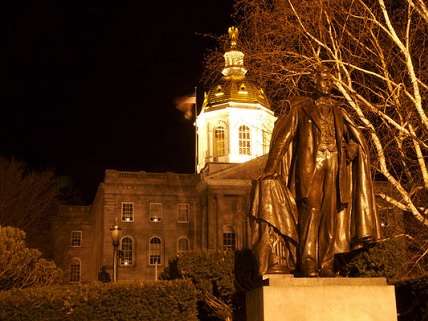The Battle Against School Choice in New Hampshire
A program that would help low-income students attend any private or public school they want, or to be homeschooled, is under fire

Last year New Hampshire enacted a tax credit to the tune of 85 percent for businesses donating toward K-12 scholarships for low-income students. (There are annual caps of between about $3 and $5 million in total credits statewide.) The scholarships can be used by parents to send their children to any school, public or private, or to homeschool them. Now the program is under attack in the state legislature and in the courts.
Such tax-credit-funded scholarships have been established in 11 states and are estimated to benefit more than 150,000 students. The scholarships are generally successful; in Florida, one study showed the presence of students receiving such scholarships improves the performance of public schools in those students' neighborhoods. The Friedman Foundation for Educational Choice tracks the performance of all variety of school choice programs. Its 2013 report [pdf] notes that the nascent New Hampshire program "has considerable room for growth," pointing out that the scholarship is capped at 19 percent of what New Hampshire spends per public school student, and that the annual cap (which does grow automatically) limits the scholarship's availability to less than 1 percent of students in the state.
Yet even this is too much for opponents of the program. "The attack is really driven by the teachers unions who don't want to have to compete," the law's senate sponsor, James Forsythe, tells reason.com. "They have a ton of money and lobbying influence." A bill to repeal the law passed the state House last year, though Forsythe argues that "the partisanship is turning," pointing out that five Democrats in the New Hampshire house voted against the repeal. In the Senate, one Republican who opposed the bill when it was first passed, Nancy Stiles, this time testified against the repeal. According to Forsythe, this splits the Senate 12–12, where a majority is needed to repeal the bill.

That's good, because the state's governor, Maggie Hassan, opposes the law and has said she'll sign a repeal if it comes to her desk. Yet she supports a similar scholarship program for college students—a law the teachers unions do not have an incentive to oppose. (The governor's office did not respond to a request for comment.)
Meanwhile, seven taxpayers are suing the state over the tax credit program. The plaintiffs, supported by the ACLU of New Hampshire and by Americans United for Separation of Church and State, argue that the program represents the use of public money to support religious institutions, since scholarships can be applied toward religious schools. "This is just a backdoor voucher scheme," according to the executive director of Americans United for Separation of Church and State, Rev. Barry W. Lynn. "Whether it's through a traditional voucher or a tax credit, the result is the same: Taxpayers are subsidizing religious instruction." Yet that argument would be just as applicable to Hassan's college program.
More importantly, the K-12 program is a tax credit–generated scholarship that includes no appropriation of public money, similar to charitable deductions offered in the federal tax code. So it's difficult to argue that the credits represent a public subsidy. Indeed, it may actually save the government money: The fiscal note prepared for the final bill projected the program would save the state more than a million dollars in its first three years, with expenditures going down at a faster rate than revenue.
Despite this, Democrats argue that the tax credit constitutes a lost opportunity for government spending. "I feel that if we cannot adequately fund our public schools and we cannot adequately fund our charter schools, we should not be creating yet another program until we do the other programs properly," Democratic Rep. Lorrie Carey told the Concord Monitor. Marc Goldberg, a spokesman for the governor, went further, claiming the tax credit "diverts millions of taxpayer dollars to religious and private schools with no standards or accountability." In a hearing on the repeal bill, Rep. Mary Gile, another Democrat, called the credit "public money," claiming it constituted "poor fiscal policy and poor educational policy."
Joining in the lawsuit as intervenor-defendants are several parents taking advantage of their program. They're being represented by the Institute for Justice, a libertarian public interest law firm. The lead attorney on the case, Don Komer, says the argument that the tax credit is the functional equivalent of the government giving money "ignores all the private decision making involved," from the businesses who decide to donate to the scholarship organizations that decide to whom to award the money, to the parents who decide where to send their children. (Thus far, only one scholarship organization has been approved by the state.) Komer notes that the federal establishment clause has long permitted these kinds of tax credits to support charitable activity. The dispositive hearing is set for April 26.
One of the parents the Institute for Justice is representing, Shalimar Encarnacion, told the Manchester Telegraph that she doesn't understand opposition to the program, which could help her send her children—one in remission from cancer, the other diagnosed with ADHD—to private school. "This is something for kids," Encarnacion told the Telegraph. "The people that have issues with it, they're not thinking about the kids….This gets businesses to invest in their communities, to better their communities. Seeing that will make students better citizens. What's wrong with that?"


Show Comments (43)